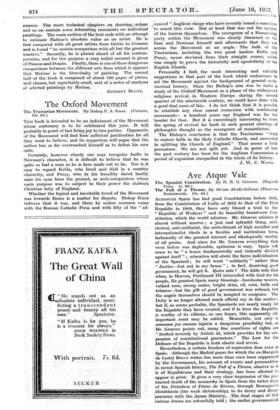Ave Atque Vale
The Fall of a Throne. By Alvaro Afeala-Galiauo. (Thornton Butterworth. 10s. 6d.) ALTHOUGH Spain has had good Constitutions before 1931, from the Constitution of Cadiz of 1812 to that of the First Republic in 1869, they have only blazed a trail to the " Republic of Workers " and its beautiful brand-new Con- stitution, which the world admires. Mr. Greaves admires it almost without reserve ; a just and splendid thing, anti- clerical, anti-militarist, the embodiment of high socialist and internationalist ideals in a flexible and meticulous form, technically of the greatest interest and ideologically worthy of all praise. And since for Mr. Greaves everything that went before was deplorable, optimism is easy. Spain will cease to be " a house fundamentally and violently divided against itself " ; education will abate the fierce individualism of the Spaniard ; he will want " solidarity " rather than " Justice—but not in my house " ; in fact, deserving good government, he will get it. Quien sabe? .The fable tells that when, in Heaven, Ferdinand III interceded with God for his people, He granted Spain many blessings—handsome women, valiant men, strong mules, bright skies, oil, corn, bulls and tobacco—but the gift of good government was refused, lest the angels themselves should be tempted to emigrate. The Deity is no longer allowed much official say in the matter ; but if, as seems probable, the Spaniards are nearly ready for the Republic they have created, and if in time the Republic is worthy of its citizens, as one hopes, this apparently all- important asset may be added. Meanwhile, not only is sunanurn jus summa injuries a dangerous possibility but, as Mr. Greaves points out, many fine assertions of rights are " limited severely by Article 42, which provides for the sus- pension of constitutional guarantees." The Law for the Defence of the Republic is both elastic and severe.
Nevertheless, a certain freedom of expression does exist in Spain. Although the Madrid paper for which the ex-Marqu& de Castel Bravo writes has more, than once been suppressed
by the Government, his account of events and personalities in recent Spanish history, The Pall of a Throne, abusive as it is of Republicans and their strategy, has been allowed to
appear in print. It gives a very clear impression of the pro- tracted death of the monarchy in Spain from the latter days of the Dictadura of Primo de Rivera, through Berenguer's ,Dictablanda (the weak dictatorship), to its decay and disap- pearance with the Aznar Ministry, ...ne_fmat stages of _this curious drama are colourfully told ; the earlier governmental plandsas (" equivalent," the translator tells us, " to the French for gaffe ") are sensibly catalogued ; the result is an interesting and mournful book, snore convincing when it deplores monarchical mistakes than when it attacks Repub- lican aspirations. Mr. Great es may be too confident, but clearly with him one must hope . .











































 Previous page
Previous page